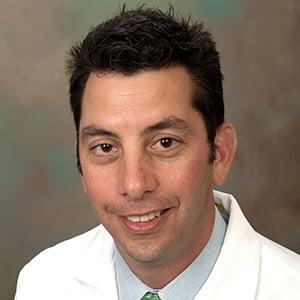You may never have heard of a disease called amyloidosis. It’s classified as rare, and very few physicians specialize in it. City of Hope hematologist and oncologist Michael Rosenzweig, M.D., M.S., is one of them — and he’s committed to developing more effective ways to treat this debilitating and often fatal illness.
What happens in amyloidosis is that the body produces abnormal proteins that then misfold to form amyloid fibrils. The body is unable to dissolve the fibrils and they subsequently attach to almost any organ and damage it. Unchecked, patients quickly become frail and may die in less than a year — but current treatments have some serious drawbacks.
Chemotherapy is most commonly used, and the response rate is about 90% — but relapse frequently occurs. Autologous stem cell transplants can also be successful, but many amyloidosis patients are too weak to tolerate the procedure.
Rosenzweig believes the solution may be found in one of the most exciting new frontiers of immunotherapy, chimeric antigen receptor (CAR) T cell therapy.
“I came to City of Hope because it’s a major center for CAR T cell research,” Rosenzweig said. “They’re moving the whole field forward under the guidance of Dr. Stephen Forman and his lab.”
With CAR T cell therapy, a patient’s own T cells — the soldiers of the immune system — are engineered to target a specific antigen expressed by the diseased tissue. The CAR T cells then destroy the disease while leaving healthy tissue untouched.
Rosenzweig is focused on using CAR T therapy for the deadliest and most common form of the disease, light-chain amyloidosis, in which amyloids are produced by plasma cells in bone marrow. This characteristic closely ties the disease to multiple myeloma, a blood cancer.
“The success of CAR T cell therapy with other hematological cancers like leukemia and lymphoma gives us the vision to pursue this for light-chain amyloidosis,” he said.
THE FIRST STEP — IDENTIFYING THE TARGET ANTIGEN
Before you can develop CAR T therapy for a particular disease, you have to know what antigen to target. Rosenzweig may have discovered it in a preclinical study he led, whose results were published in the peer-reviewed journal Cytotherapy.
“We looked at bone marrow samples in patients with light-chain amyloidosis and found that it predominantly expressed the antigen CS1,” he said. “We’ve just launched a City of Hope CAR T study targeting CS1 — the first one of its kind I’m aware of.”
This new trial, led by Maung Myo Htut, M.D., and Xiuli Wang, Ph.D., will first test the treatment on multiple myeloma patients, whose marrow also expresses CS1, because amyloidosis leaves most people too weak to try an untested drug.
“We have to make sure amyloidosis patients will be able tolerate the treatment, because they often have compromised organ function, particularly with the heart,” Rosenzweig said.
Once the treatment proves safe and effective for multiple myeloma, Rosenzweig will begin enrolling amyloidosis patients in a separate study.
INCREASING AWARENESS
Because amyloidosis is classified as a rare disease — although it strikes between 100-180 people a year in Southern California and about 10% of all multiple myeloma patients — it hasn’t gotten much attention.
In fact, until very recently, the treatments patients received had been approved for myeloma, but no treatment had ever been specifically designated for amyloidosis.
Then, just last fall, two treatments, inotersen and patisiran, received Food and Drug Administration (FDA) approval for a hereditary form of the disease called transthyretin amyloidosis, or ATTR. Both treatments are RNA inhibitors, a class of drugs that target genetic disorders. In patients with ATTR, they can stop the translation of certain genes into proteins that would otherwise form amyloids.
These first-ever FDA approvals will not only aid patients with ATTR, they’re bringing some much-needed attention to both types of amyloidosis.
“It’s an exciting development because it’s helping to increase awareness of all forms of the disease,” said Rosenzweig. “And this is so important, not only because it will help support further research, but also because early diagnosis is critical to the survival of patients with amyloidosis.”
****
